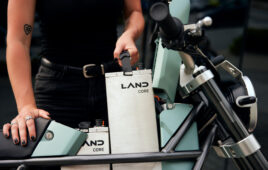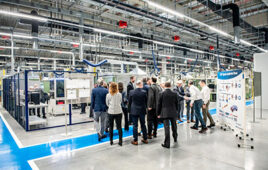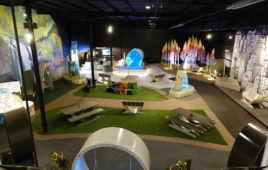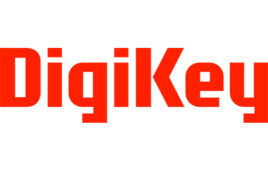 BigRep, a leader in large-format 3D printing, launched a fully 3D-printed urban green habitat installation using multiple, recycled plastic-based filaments — called the Genesis Eco Screen.
BigRep, a leader in large-format 3D printing, launched a fully 3D-printed urban green habitat installation using multiple, recycled plastic-based filaments — called the Genesis Eco Screen.
Addressing some of the biggest environmental challenges such as plastic waste, overconsumption of energy and other resources, rapidly deteriorating biodiversity and urbanization, the installation is a prototype in urban architecture and a showcase in Additive Manufacturing (AM) of a scalable, city-developing circular economy.
The installation features unprecedented innovations made possible only by using custom-made generative design algorithms and the world’s largest, serial production 3D printers (FFF).
The Genesis Eco Screen features an embedded water and drainage system for plants and insect habitats, including a shelter for solitary bees. Measuring a full 4 by 4 meters, the Genesis Eco Screen is reminiscent of a massive root system, and is printed using multiple filaments — consisting of BigRep PETG and BASF Innofil3D rPET made of 100% recycled PET printed on four large-scale ONE printers. The project, set to be completed by late August, will be on display in downtown Berlin.
The actual printing has been occurring at a public site, the Thaersaal at Humboldt University. Once completed, the Genesis Eco Screen will be on display at the Fiction Forum exhibition center, the site of a now-demolished East German border control station that left a gap between East and West.
“Disruptive technologies such as 3D printing are key to solving some of the world’s biggest problems,” said BigRep CIO and NOWLAB Managing Director Daniel Büning. “We want to deliver groundbreaking innovation to maximize the potential of AM, thereby creating entirely new applications. With this project, we are introducing a new and truly sustainable manufacturing protocol to the manufacturing of polymer objects using multiple pre-used plastic materials. The Genesis Eco Screen shows how society can develop a greener future — with circular economy solutions that are sustainable, local, modular and collaborative.”
Circular economy is aimed at minimizing waste by closing the gap between resource input, waste, emissions and energy usage. This is achieved by reducing consumption and material usage. Set up at Fiction Forum as a closed loop process, the PET bottles are recycled as an input material and 3D printed for an innovative, yet hands-on, showcase for production to demonstrate this approach.
At the Thaersaal, the public can learn more about this closed loop process in an exhibit detailing the steps turning waste into high-tech printing material. Used PET-bottles are delivered to a collection point, cleaned and pre-processed for the Dual Axel Shredder, a machine designed by the Germany company raw paradise. It processes the plastic into printable raw material for the actual filaments that are produced with a filament extruder.
The filament is a long strand, only 2.75 mm in diameter, and it looks like a cable. Coiled on filament spools, one for each printer, it is fed into the large-format ONE printers.
The Genesis Eco Screen was created using some of the most advanced self-generating design algorithms and agent-based modeling. These algorithms and agents are intelligent tools, almost comparable to AI, capable of autonomously designing complex geometries with only a few pre-set parameters. For the Genesis Eco Screen, these included, for example, a data analysis of the sun exposure across the installation in order to be able to optimize the diameter of the 3D-printed “branches” and the creation of the shading features and plant positioning accordingly.
Fiction Forum
www.kreativ-bund.de/fictionforum
BigRep GmbH
www.bigrep.com
Filed Under: 3D printing • additive • stereolithography, Green engineering • renewable energy • sustainability, MOTION CONTROL




